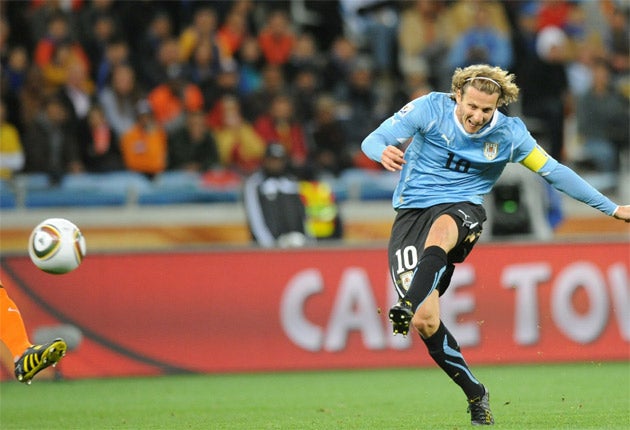Farewell Forlan, the reborn star who tamed the Jabulani

T-shirts have been on sale in Cape Town (and probably in Accra as well) to those wishing to support "anyone but Uruguay". Luis Suarez's handling offence in the last minute of the tie against Ghana rendered the South Americans unpopular semi-finalists, when the whole of Africa and much of the world beyond, was desperate to see a team from that continent among the World Cup's last four for the first time.
In other circumstances, they might have been cast as the popular underdogs, at least by those who understand the pride of a nation numbering merely three and a half million people, of whom the most talented footballers are quickly drawn to European riches. Of last night's 11 starters, the little bald midfielder Egidio Arevalo was the only one representing a Uruguayan club.
Yet to judge by such noise as was audible above the ubiquitous vuvuzelas, bouncing off the roof of this magnificent stadium, there were plenty of enthusiasts present who were prepared to acknowledge the spirit with which the smaller country declined to lie down and let the weight of football talent have its way. Diego Forlan's latest contribution to a personal odyssey to make Manchester United supporters weep suggested he must be in the small minority of players taking part who love to strike the Jabulani ball. As against South Africa and Ghana, a blast of his from well outside the penalty area flew high into the net.
Giovanni van Bronckhorst must be another fan after one of his less frequent interventions gave the Dutch the lead. Too soon? Their coach Bert van Marwijk – "I cannot change the culture" – has admitted many times that the team tend towards arrogance in victory. Sometimes it occurs even earlier; costing the nation a one and only World Cup in 1974, when Jack Taylor's award of a penalty in the first minute of the final offered them a goal but also encouraged the team to strut around and attempt to humiliate West Germany rather than merely defeat them.
The defence has been an underrated part of the current side, the perception being that there was a soft centre. Yet until Robinho scored early on against them for Brazil, the only goals conceded had been penalties, by Cameroon's Samuel Eto'o and (when it was too late to matter) Slovakia's Robert Vittek. In qualifying, two went past them in eight games.
The trend seemed set to continue here for half an hour in which Forlan, playing right at the front instead of just behind two other strikers, where he had previously revelled in the space, was receiving no change in any currency from Joris Mathijsen and Everton's John Heitinga. The first time he dropped deeper without being followed and was able to run at one of them, an eruption followed and concerns about defensive fallibility suddenly looked more convincing than the statistics.
Maarten Stekelenburg's save from Forlan's free-kick was crucial and within the space of three minutes, Wesley Sneijder and Arjen Robben, adversaries in the Champions League final, were goalscoring comrades-in-arms and on their way to an even bigger date. Despite Maxi Pereira's unscheduled late intervention the T-shirt wearers were happy after all.
Join our commenting forum
Join thought-provoking conversations, follow other Independent readers and see their replies
Comments